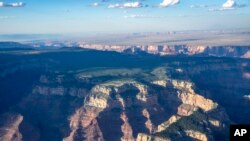President Joe Biden flew to Arizona Monday, looking to tout his climate agenda on a multi-state trip through a region still recovering from a brutal, record-setting heat wave.
The first stop on his tour will be to the Grand Canyon where, according to several U.S. media outlets, he is likely to name a new national monument.
The declaration would effectively prevent uranium mining in the area, a ban sought for decades by local Native American tribes.
Biden, who is running for reelection, plans to use the trip to "highlight how his administration has made historic investments in climate, conservation, and clean energy," according to the White House.
He will also spend Tuesday in Arizona, before traveling the next day to neighboring New Mexico.
Both states and the surrounding region have experienced severe heat waves this summer, with Arizona's capital Phoenix in July recording the hottest month ever for a U.S. city.
Scientists warn that global warming is making heat waves hotter, longer and more frequent.
The trip comes just ahead of the one-year anniversary of Biden's signing of the Inflation Reduction Act, a mammoth package of climate investments and other programs that has become the centerpiece of his first term in office.
Biden regularly describes climate change as an "existential threat," and criticizes his Republican opponents for failure to act on the issue.
Billions in investment
The Inflation Reduction Act funnels some $370 billion into subsidies for America's energy transition, including tax breaks for U.S.-made electric vehicles and batteries.
Since the climate law was signed, about $75 billion in new manufacturing investments have been announced, according to policy analyst Jack Conness of think-tank Energy Innovation: Policy and Technology.
Beyond the Inflation Reduction Act, the overall amount unveiled by private companies across critical areas ranging from semiconductors to EVs is even larger.
The White House touts some $503 billion in commitments to key industries under the Biden administration, which has also seen the passage of other legislation including the American Rescue Plan and the Chips and Science Act.
But it remains unclear if the investment gains are translating into clear optimism on the ground, with a Gallup poll in June finding that 66 percent of Americans say the economy is getting worse.
And nearly 60 percent of Americans disapprove of Biden's handling of climate change, according to a Washington Post-University of Maryland poll conducted last month. The survey also found that few adults said they knew a good amount or great deal about the IRA.
With Biden's reelection campaign underway, the Democrat is touting his "Bidenomics" economic agenda, which involves bringing manufacturing back to the United States after decades of offshoring.
Besides addressing the summer heat crisis, Biden's visit to Arizona comes with electoral incentives.
The 80-year-old Democrat narrowly won Arizona in 2020, and it is among the handful of states expected to be decisive in determining next year's presidential election.
On Thursday, Biden is expected to travel to Utah where the focus will be on veterans' programs.




